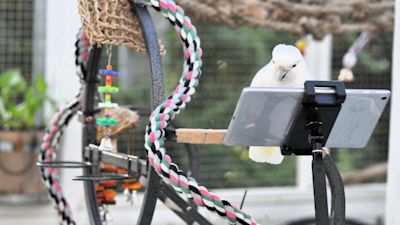Open University finds parrots can communicate with humans using digital technology

Describing someone as bird brained might be more complimentary than you think.
Recent scientific research has shown that some bird species have intelligence which enables them to communicate, use tools, solve puzzles and even hold grudges.
Now new research from the Open University in Milton Keynes has found evidence parrots are able to express their wants and feelings with humans via digital tools.
The results showed that the birds, kept in human care, could exercise a form of communication when selecting from a digital tablet ‘speech board’ with selectable options.
In a new paper co-authored by Professor Clara Mancini found a Goffin’s cockatoo, named Ellie, showed she could use digital tablets to ask for food or tell humans how they were feeling.
Professor Mancini, Head of the Animal-Computer Interaction Laboratory at the OU’s School of Computing and Communications, said: “Animals in human care largely depend on us to meet their biological and social needs. This research demonstrates digital technology’s potential to offer them tools for expressing and meeting their needs.
“It also highlights the importance of designing these technologies from the animals’ perspective, by considering their species-specific characteristics, by prioritising the communication functions that matter to them, and by affording them optimal usability and access.”
Mostly, Ellie used her speech board to instigate interactions with her caregiver, to express her emotional states and to make requests and interact with her environment via a human proxy.
The research was conducted in collaboration with Parrot Kindergarten, Florida, which for many years has been teaching parrots to use a speech board to communicate by touching different objects on the screen with their beak.
Jennifer Cunha, Adjunct Assistant Professor at Texas A&M University College of Veterinary Medicine and Biomedical Science and co-founder of Parrot Kindergarten, said:
“Working with Ellie is an incredible experience. This study exemplifies the extraordinary cognitive abilities of parrots, showing strong evidence that Ellie engages in intentional communication. Her use of the speech board advances our ability to facilitate meaningful communication with animals. I believe all parrots are capable of voice in this way. It is my enduring wish that understanding their intelligence leads to greater respect and care for the birds in our lives.”
It's the latest in a number of studies which have shown that some bird species have a higher level of intelligence than was at first thought.
Researchers at Harvard in the US found that parrots were capable of the kind of cognitive tests that some 5-year-old children found difficult.
Researcher's at the University of Cambridge used an ancient fable as part of a scientific experiment.
The experiment is based on Aesop's Fable and scientists say it illustrates how children and crows learn about the world.
In the story by the ancient Greek a thirsty crow drops a stone into a jug of water. Eventually the water levels rise high enough for the crow to drink. Researchers demonstrated they could do it in real life.
And the New York Times reported how Dr John Marzluff, a researcher at the University of Washington, in Seattle in the USA, had found that Crows were capable of holding a grudge for an incredible 17 years.
Dr Marzluff conducted an experiment in which, wearing a mask, he caught a number of crows, releasing them unharmed shortly afterwards.
The incident apparently had along-term impact on the birds. Dr Mazluff would occasionally wear the same mask around the university campus. It took 17 years for the birds to forget.
Looking to the future, the Open University study findings suggest speech boards could be used to study parrot cognition and how speech board interfaces could be designed to best support parrots’ communication abilities and needs.
Corinne Renguette, Associate Professor at Purdue University’s Department of Technology Leadership and Innovation, commented:
“This work suggests that animals, like humans, have complex communication needs, and using technology might be one way to improve their wellbeing by giving them some agency over their environment.”
The paper, can be read in full here
Want a quick and expert briefing on the biggest news stories? Listen to our latest podcasts to find out What You Need To Know